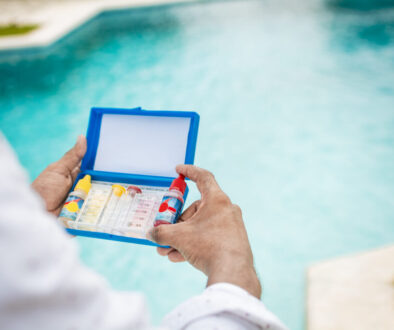Beyond Cleaning: Sell More Stuff and Grow Your Bottom Line
Unlock new revenue streams by learning how to effectively cross-sell pool accessories and chemicals in your service business.
In an increasingly competitive market, pool service businesses must explore every avenue to boost their revenue. One such avenue is the strategy of cross-selling pool accessories and chemicals. This blog post delves into the significance of cross-selling, offering techniques and insights to maximize profits while enhancing customer satisfaction. We’ll discuss the types of products you can cross-sell, the benefits of doing so, and how to implement a successful cross-selling strategy in your business.
IntroductionIn the pool maintenance industry, service providers often find themselves in direct competition for the same customers. As a result, it’s crucial to differentiate your offerings and provide maximum value. Cross-selling pool accessories and chemicals is not only a way to increase your sales but also to enhance your customer’s experience. By understanding your client’s needs and suggesting complementary products, you can build a loyal customer base that sees you as a one-stop-shop for all their pool-related needs. This article will explore the various aspects of cross-selling within the pool service industry, including its benefits, effective strategies, and the types of products that can be offered alongside your services.Understanding Cross-Selling in Pool Services
Cross-selling involves offering additional products or services to existing customers, aiming to maximize the value of each customer interaction. In the context of pool services, this might mean recommending pool chemicals or accessories during a routine maintenance visit. According to a recent industry report, businesses that effectively engage in cross-selling can increase their sales by up to 30%. For instance, if a technician is performing a routine pool cleaning, they might notice that the pool’s pH levels are off. By suggesting the appropriate chemicals to correct the levels, the technician not only helps the customer maintain their pool but also generates additional revenue. This illustrates how cross-selling can be mutually beneficial, enhancing customer satisfaction while driving sales growth.
Benefits of Cross-Selling Pool Accessories and Chemicals
The advantages of cross-selling extend beyond immediate financial gain. Here are some key benefits to consider:1. Enhanced Customer Relationships: By offering valuable products based on your customer’s specific needs, you establish trust and build long-term relationships. Customers are more likely to return to a service provider who understands their needs and offers relevant solutions.2. Increased Average Transaction Value: Cross-selling can significantly increase the average transaction value. For example, if a customer spends $50 on a cleaning service and you successfully sell them $20 worth of chemicals, you’ve increased the total sale without substantial additional effort.3. Improved Customer Retention: A satisfied customer is likely to remain loyal and return for future services. By consistently providing valuable recommendations, you reinforce the value of your service, encouraging repeat business.4. Diversified Revenue Streams: Relying solely on service income can be risky, especially during off-peak seasons. Cross-selling products can help stabilize cash flow, providing income even during slower months.5. Competitive Advantage: Offering a comprehensive range of products can set your business apart from competitors. Customers are attracted to one-stop solutions, making cross-selling an effective way to gain market share.
Types of Products to Cross-Sell
When considering cross-selling, it’s essential to choose products that complement your services. Here are some common categories of pool accessories and chemicals that can be effectively cross-sold:1. Chemicals: Regular maintenance of pool water quality requires a variety of chemicals, including chlorine, pH balancers, and algaecides. Educate your customers about the importance of these products and suggest them during routine cleanings.2. Cleaning Equipment: Pool vacuums, brushes, and skimmers are essential for maintaining a clean pool. By demonstrating how these tools work and their benefits, you encourage customers to invest in their pool upkeep.3. Safety Products: Items like pool covers, safety ladders, and life rings not only enhance safety but also protect the investment in the pool. Highlighting the importance of safety can make these products more appealing.4. Pool Toys and Accessories: Fun items such as floats, toys, and games can enhance the pool experience for families. By offering these products, you appeal to the recreational aspect of pool ownership.5. Seasonal Products: As seasons change, different products become necessary. For instance, winterizing kits can be sold in the fall, while summer accessories can be highlighted when the weather warms up.
Effective Cross-Selling Strategies
To effectively implement cross-selling in your pool service business, consider the following strategies:1. Train Your Staff: Ensure that all employees understand the benefits of cross-selling and are knowledgeable about the products available. They should feel confident recommending additional items based on customer needs.2. Bundle Products: Create bundled offers that combine services with related products at a discounted rate. For example, offer a cleaning service that includes a free set of chemicals for first-time customers, encouraging them to try the products.3. Utilize Marketing Materials: Use brochures, flyers, and social media to highlight the benefits of your products. Share tips on pool maintenance that incorporate your products, showcasing their value.4. Leverage Technology: Use customer relationship management (CRM) tools to track purchases and preferences. This helps in personalizing communication and targeting specific customers with relevant product recommendations.5. Seek Customer Feedback: Engage customers in conversations about their pool needs and preferences. Their insights can help tailor offerings and identify which products to promote more effectively.6. Promote Seasonal Offers: Create special promotions around holidays or seasonal changes. For example, offer discounts on cleaning supplies in spring when many pool owners are preparing their pools for use.
Implementing Cross-Selling in Your Business
Transitioning to a cross-selling strategy requires some planning and implementation. Here’s how you can start:1. Analyze Your Current Offering: Take stock of your existing products and services. Identify which items have the potential for cross-selling based on your customer demographics and buying patterns.2. Create Packages: Develop service packages that include both your services and recommended products. Make sure these packages are easy to understand and offer clear value to your customers.3. Educate Your Customers: Use workshops, newsletters, or social media posts to inform your clients about the importance of using quality products. Share tips on maintaining a pool that highlight the need for accessories and chemicals.4. Monitor Performance: Regularly evaluate the effectiveness of your cross-selling strategy. Track sales data and seek customer feedback to identify areas for improvement.5. Adjust as Needed: Be flexible and ready to change your approach based on what works best for your business and your customers’ needs.
Case Studies: Successful Cross-Selling Examples
To illustrate the effectiveness of cross-selling, consider the following examples:- Local Pool Service Company: A small pool service business started cross-selling chemicals during regular maintenance visits. By training technicians to identify chemical needs and offering discounts on bundled purchases, they saw a 25% increase in overall sales within six months.- Online Pool Supply Retailer: An online retailer of pool supplies implemented a recommendation engine that suggested accessories based on customers’ previous purchases. This strategy not only increased the average order value but also enhanced customer satisfaction, as buyers appreciated the tailored suggestions.These examples underscore the potential for cross-selling to drive revenue growth while improving customer experience, proving that a well-executed strategy can yield significant benefits.
Conclusion
Incorporating cross-selling into your pool service business is a powerful way to boost revenue and enhance customer satisfaction. By offering well-chosen accessories and chemicals that complement your services, you can create additional revenue streams while providing your clients with the products they need for optimal pool maintenance. As you implement these strategies, remember the importance of understanding your customer’s needs, providing exceptional service, and continuously refining your offerings based on feedback and performance. The pool maintenance industry is full of opportunities; leveraging cross-selling can position your business for sustained growth and success. To explore how Tower Business Brokers can help you succeed in the industry, connect with us today. Whether you’re looking to buy pool routes or desire guidance on maximizing your existing business, we are here to support your journey. Contact us for more insights on how to effectively integrate cross-selling into your business model and explore our available pool routes for sale.



